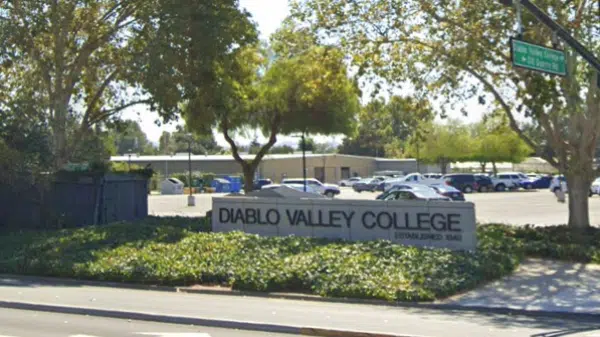
According to KRON4, a faculty member and former track coach at Diablo Valley College, located at 321 Golf Club Rd, Pleasant Hill, CA 94523, has been arrested and charged with human trafficking, pandering, pimping, and other related offenses involving the use of force during sexual acts. The charges were announced by prosecutors on Tuesday, September 12, 2023, sending shockwaves through the Bay Area community.
The 39-year-old suspect, Kyle Lee Whitmore, hailing from Crockett, is currently being held without bail at the Martinez Detention Facility. Whitmore stands accused of trafficking two women, identified as Jane Doe #1 and Jane Doe #2, for the purpose of prostitution. Additionally, he faces one count of pimping and four counts of sexual penetration by a foreign object. Of grave concern is the revelation that at least one of the victims is a student, according to Tim Leong, a public information officer for the Contra Costa Community College District. The district has chosen not to disclose her identity to safeguard her privacy.
The allegations came to light when Jane Doe #1 bravely reported her situation to authorities at Diablo Valley College. Following an extensive investigation conducted by campus police and the Contra Costa County Sheriff's Office, Whitmore was apprehended and taken into custody. The involvement of "Jane Doe #2" in relation to the college remains unclear at this time.
Kyle Lee Whitmore, who taught communication studies and served as a former track & field coach at Diablo Valley College's Pleasant Hill campus, enjoyed a notable career. In fact, he was recognized as the "Coach of the Year" in 2022 for California community colleges. However, the recent revelations have tarnished his reputation and shocked the college community.
Tim Leong stressed the seriousness of the situation and the district's commitment to ensuring the safety of its students and staff members. He highlighted the collaboration between the college's staff, campus police, the sheriff's office, and the district attorney's office in addressing this distressing matter. Leong urged the community to exercise patience and refrain from making assumptions or engaging in speculation, as the investigation is still ongoing.
The charges filed by the District Attorney's Office against Whitmore include nine felony counts, some of which involve a student. As this case unfolds, more details are expected to emerge. The district remains devastated by the gravity of the allegations and emphasizes its commitment to upholding appropriate behavior and safeguarding the welfare of its students and staff.

In light of the recent case of alleged sex trafficking in California, we sat down with esteemed human trafficking attorney, Jason Amala, Esq., to delve into the legal options available to survivors seeking justice through civil cases. With a focus on empowering survivors and shedding light on their rights, Amala shares valuable insights into the steps survivors can take, the legal avenues they can explore, and the support networks available to them. Join us as we navigate the path to justice and learn how survivors can hold those accountable for their trafficking experiences.
Editor Darla Medina (DM): Thank you for joining us, Mr. Amala. As a human trafficking attorney, could you shed some light on what survivors of trafficking can do in terms of pursuing a civil case against those responsible?
Attorney Jason Amala, Esq. (JA): Thank you for having me, Darla. When it comes to survivors of trafficking seeking justice through civil litigation, there are several avenues they can explore. Firstly, it's important to remember that each case is unique, and survivors should consult with an experienced attorney to discuss their specific circumstances.
DM: Absolutely, seeking legal guidance is crucial. Could you outline some general steps survivors might take when considering a civil case?
JA: Certainly. The first step is to gather any evidence available to support the case, such as photographs, videos, or any other documentation that may help establish the elements of the claim. This evidence can be crucial in proving the liability of those accountable for the trafficking.
DM: That makes sense. What legal options are typically available for survivors pursuing a civil case?
JA: Survivors may have various legal avenues, depending on the circumstances. They could potentially file a civil lawsuit against the traffickers themselves, seeking damages for the physical and emotional harm they endured. Additionally, in certain cases, they might consider filing a lawsuit against other parties who may have contributed to or benefited from the trafficking, such as facilitators, property owners, schools, colleges, or online platforms.
DM: I see. And what factors should survivors consider when deciding whether to pursue a civil case?
JA: It's important for survivors to carefully evaluate their emotional readiness and the potential impact that pursuing a civil case may have on their healing process. They should also consider their privacy concerns and whether they feel comfortable with the potential exposure that comes with engaging in legal proceedings.
DM: Those are important factors to consider indeed. Lastly, are there any resources or support networks available to survivors who wish to pursue a civil case?
JA: Absolutely. There are organizations and support networks specifically dedicated to assisting survivors of trafficking with legal matters. They provide resources, guidance, and emotional support throughout the legal process. Connecting with these organizations can be invaluable for survivors seeking justice. Experienced sex trafficking attorneys can help survivors and their families get the support they need.
DM: Thank you, Mr. Amala, for sharing your insights and shedding light on this important topic. We appreciate your time and expertise.
JA: It was my pleasure, Darla. Thank you for raising awareness on this critical issue. Survivors of trafficking deserve justice, and I hope that by discussing their legal options, we can empower them to seek the justice they deserve.
Sources:
 info@legalherald.com
info@legalherald.com